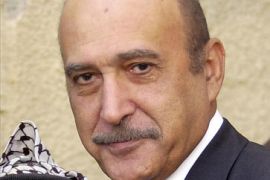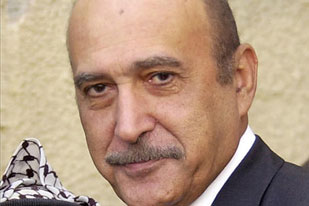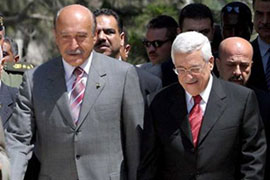Profile: Omar Suleiman
Egypt’s spy chief is a key broker in talks between Israel and the Palestinians.

 |
| Suleiman has headed the Egyptian intelligence service since the early 1990s [AP] |
Unusually for an Egyptian secret service chief, General Omar Suleiman has come into the public view in recent years – mostly for his efforts to mediate between Palestinian factions and Israel.
Suleiman, who has headed the Egyptian intelligence service since the early 1990s, took up his mediating role in 2000, following the outbreak of the second intifada.
He had some success negotiating a brief ceasefire in June 2003.
His efforts have earned him the respect of Egyptian, Israeli and US diplomats and politicians, with many, including Yossi Sarid, a former Israeli Knesset member, calling Suleiman a positive influence on negotiations.
But his critics have questioned his motivation – saying he is acting only to quell popular Egyptian sentiment.
Many also argue the temporary ceasefires simply allow Hamas and other Palestinian groups to rearm, often via smuggling tunnels running between Gaza and Egypt.
Military service
Suleiman was born in Qena, in the south of Egypt. He left for Cairo at the age of 19 to enroll in Egypt’s military academy and went on to receive advanced military training in Russia.
He took part in in both the 1967 and 1973 Middle East wars, though details of his service are unclear.
 |
| Suleiman’s diplomatic work has made him more of a public figure [EPA] |
Sulieman’s position as head of the Arab world’s most significant intelligence agency and his closeness to Hosni Mubarak, the Egyptian president, gave rise to speculation that he could contend with Gamal Mubarak, the president’s son, for the position of Egypt’s next ruler.
Both Mubarak and Suleimen survived an assassination attempt in Addis Ababa, the Ethiopian capital, where they were due to attend an African summit in June 1995.
The limousine Suleiman and Mubarak were travelling in came under fire, killing a number of bodyguards travelling with their convoy, before the driver was able to turn the car round and return to the airport.
The attack was blamed on members of the al-Qaeda-linked Egyptian Islamic Jihad, also known as the Society of Struggle, and said to be co-ordinated by Showqi al-Islambouli, a member of Egyptian Islamic Jihad.
His brother, Khalid Ahmed Showqi al-Islambouli, arranged and carried out the assassination of Mubarak’s predecessor, Anwar Sadat, during a military parade in October 1981.
The Egyptian secret service regularly rounds up and arrests Muslim activists.